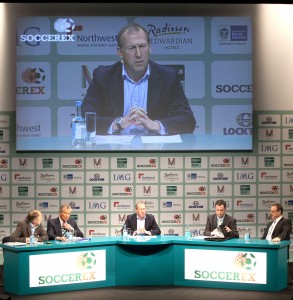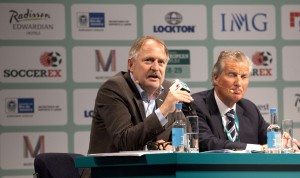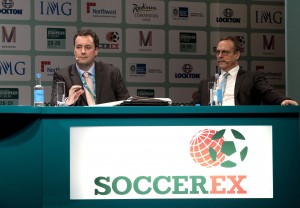Soccerex European Forum – Manchester (March 2012): Betting in Football
Day 1: Wednesday 28 March 2012
15:45 – 17:00 Betting in Football
- Kevin Roberts (Editorial Director, Sport Business) [Moderator]
- Chris Eaton (Head of Security, FIFA)
- Theo van Seggelan (General Secretary FIFPRO)
- Andrew Trollope (QC)
- Russ Wiseman (Head of Media, Sportingbet)

Kevin Roberts opened this session by acknowledging that betting in football is now huge business which has increased with the rise of online access and availability. However, he added there was a dark side to this, that came in the form of accusations of match-fixing. It has hit the headlines in other sports more recently, in regard to a number of Pakistan Test cricketers, but football knows it has problems to address.
Theo van Seggelan (General Secretary FIFPRO [International Federation of Professional Footballers – worldwide representative organisation for professional football players]), showed a video to the audience which was part of the FIFPro Black Book research into problems in Eastern European Football. The study covered a full spectrum of issues within the game in this part of the world, including match-fixing. Theo van Seggelan detailed that it was found that 50% of those involved in this illegal activity were suffering some form of contract problem and that the issue was not confined to players. To counter the situation, he suggested that there had to be a way that players were paid on time, that referees were appointed to games as late as possible, that there was the introduction of more play-offs, an amnesty and rehabilitation process was introduced and training and a code of conduct created for all those involved in the game. He added that evaluating information from ex-players who had been involved in match-fixing was vital as was an incentive scheme for ‘whistle-blowing’. Theo van Seggelan finished his presentation by concluding that match-fixing was the biggest threat to the game and that this was mainly coming from the East. In order to combat the issue, football needed the support of the authorities and required the collective effort of all the stakeholders. Even small steps are important in fighting to stop the game being ruined.
Kevin Roberts asked Russ Wiseman about what the betting industry does with regard to match-fixing allegations. Wiseman outlined how the regulated industry analyses betting patterns and if they feel there is a problem on a particular game or event, then betting is suspended. Given this situation he said it was more difficult these days to pull off a betting coup. He continued, that in the last 20 years the relationship between football and betting had changed. Most clubs have some form of betting link and it was an accepted income stream for the game. Looking back, 20 years ago, football accounted for 15% of bets, whereas now the figure is 70%. Wiseman said that the area for concern was the Asian Market and areas of unregulated betting.
Next to speak was Chris Eaton, who was asked how a big a problem was match-fixing according to FIFA. Eaton pointed out straightaway that players were not just the victims in this, in that they had a conscious choice in whether to become involved in fixing games. He agreed with Russ Wiseman in stating that the regulated industry was not a problem and that the unregulated markets of South East Asia were the areas of concern. He continued that in these parts of the world it was a major and well organised criminal activity that went well beyond the field of football. Eaton said it was a global issue and that the criminals were the responsibility of governments. Kevin Roberts asked though what FIFA was doing to address the problem. Eaton explained that FIFA recognised that players, referees and club administrators were being targeted and intimidated and was attempting to ensure that where possible access to these groups was limited. He added that the problems existed because of the economic or cultural vulnerability of some involved in football. By cultural vulnerability, Eaton explained that in some countries football players had no standing or respect and therefore were a target. He concluded that these criminals picked their targets, going for the easiest and weakest and therefore most vulnerable people.
QC Andrew Trollope was asked about the legal issues around football and betting problems and to whether the courts and police are set up to deal with it. Trollope cited cricket as an example where the system had worked, with the legal and cricket authorities working together to provide a clear process. In football, he said that there needed to be work with the regulators of the game and the introduction of a framework to protect those who inform from outside influences. It was important that there is a clear statement of principles for officials, chairman, referees and players, which identified the warning signs and provided guidance on likely games where issues may arise. Trollope stated that the education of young players was imperative, as was the need for some form of ‘whistle-blowing’. Those caught should suffer major consequences through criminal proceedings, but it has to be a consistent and worldwide approach.

The panel was asked if the youngest players were the most vulnerable to match-fixing. Chris Eaton replied that this wasn’t necessarily the case, since the approaches could be made to coaches and parents. He highlighted that those families who are financially vulnerable were easy targets and as a result the issue of ‘player-trafficking’ was becoming a menace.
Russ Wiseman then responded to a question about games at the end of a season, where results had more meaning. He reiterated that the betting industry was providing an early warning system when patterns emerged and they scrutinised those games where mutually beneficial results had a possible major impact. Wiseman said that where patterns were identified, betting was immediately suspended on the game in question. Theo van Seggelan suggested that perhaps more play-offs would help, in that there would be less betting on the place a team would finish in a league.
A question was asked as to whether ‘goal-line’ technology would help curb match-fixing. Chris Eaton replied that it could be a help, but in no way was it a solution, as this would not impact something like a referee awarding penalties late in a game.
It was brought to the panels attention that in recent years, tobacco sponsorship had been removed from sport on moral grounds, so on this basis was betting an appropriate partner for football. Russ Wiseman said that there was no conflict in the links that football had with betting. Many clubs had an official betting partner and a number had them as shirt sponsor. In working with the clubs, he believed this was a method of guarding against match-fixing. Chris Eaton added that for clubs and the betting industry it was in their mutual interest to have a game that was clean and fair, and that regulation was the key.
Chris Eaton was asked about his imminent move from FIFA to ICSS. Eaton informed the audience that the International Centre for Sport Security (ICSS) is an international not-for-profit institution, based in Doha, Qatar, that aims to help organizers stage safer world-class sporting events. Eaton said that he was disappointed that the FIFA ‘whistle-blowing’ programme had not got off the ground, but understood why it had been integrated into the wider Governance and Corruption investigations by World Football’s governing body. Theo van Seggelan highlighted that players would perhaps have been afraid to use a ‘hot-line’ without some form of protection and said that players were fearful of reporting incidents since they would be immediately suspended by their respective Football Associations. He also questioned how easy was it for players to get through to FIFA. Chris Eaton responded that there was a process in place, whereby information was taken in evidence form and action taken then against criminals. He added that he had been approached by players and other football officials in various places, who wanted to give evidence. However, for now it was a matter of waiting to see what findings emerge from the FIFA investigations into its own Governance before the next stage on eradicating match-fixing is established.

It was asked whether betting in football should be stopped, to which Chris Eaton suggested that all this might do is cause a displacement of the money waged and therefore match-fixing from football to another sport, as well as increase the unregulated market.
Kevin Roberts closed the session by asking the panel for one thing they would do in relation to ‘Betting in Football’. Theo van Seggelan responded that he would have better education for young players and introduce a confidential help-line as part of a structure for ‘whistle-blowing’. Andrew Trollope agreed with these suggestions and stated that he believed the football industry could and should pay for the setting up of a suitable infrastructure and that it would be the responsibility of the National Football Associations. Russ Wiseman said that regulated betting provides valuable information on betting patterns, but action is still slow, as a case in point, where a game from last season was still being investigated (involving Levante and Sporting Gijon). Chris Eaton wanted a strong a committed partnership between Sporting Administrators’, Governments’, Regulators’ and Gambling Administrators’ to tackle the issues on a national and international level.
Pingback: UEFA European 2012 Championship: Preview – football book reviews